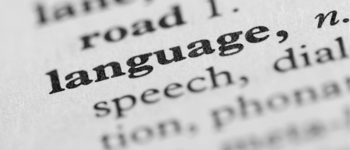Policy on Student Interpreting
Rationale
The Bachelor of Science degree program in Signed Language Interpreting (SLI) was established with the goal of providing qualified, professional signed language interpreters to the deaf and hearing communities.
Any professional program of training depends on students receiving instruction in a logical, orderly manner. When it comes time in the course of studies for a student to come into contact with the public, it is incumbent on the program to provide structured experiences with ample opportunity for guidance from qualified supervisors.
This policy has been adopted by the SLI faculty with the firm belief that it is in the best interest of students, the SLI, and the interpreting profession. It represents a commitment by the SLI faculty to provide students with the highest quality practicum interpreting experience possible. In return, students are expected to abide by certain regulations designed to protect the integrity of the SLI curriculum.
In addition, the faculty believes that this policy ensures that consumers receive the best available interpreter service. Providers of interpreter service often fail to understand the complexity of the task and, therefore, assume that persons with little or no professional training can adequately handle difficult interpreting situations. It is the responsibility of our program not only to strive for excellence from ourselves and our students but also to serve as a leader on promoting high professional standards in our community.
Policy
- Students accepted in the SLI will be required to complete a specified number of hours of practicum interpreting experience under guidance of supervising interpreters approved by full SLI program faculty.
- Practicum hours may only be completed while the student is enrolled in Practicum (Sign 419).
- During practicum interpreting and supervision, the Registry of Interpreters for the Deaf Code of Ethics will serve to guide students and supervisors in order to protect deaf and hearing clients' right to privacy.
- The practicum instructor has final authority on which situations/settings can be applied toward the practicum requirement.
- Students in the SLI who do not hold RID certification shall not accept or engage in unsupervised or unapproved interpreting, with the following exceptions:
- The instructor may ask the students to interpret in certain extreme emergency situations where the conditions of this policy are not met. For example, students may be asked to interpret prior to enrolling in practicum or in situations where it is not possible to have a supervising interpreter present.
- The faculty recognizes that in rare, unplanned or unforeseen circumstances, students may be unavoidably required to perform unapproved interpreting.
- In cases (a) and (b) above, it is the student's responsibility to schedule a meeting with the instructor to discuss the situation, obtain feedback on any technical or ethical problems encountered and receive guidance on how to appropriately handle any future situations. This meeting should take place as soon as possible after the situation in question.
- Regarding students working within the Deaf Community
- Uncertified students who have employment within the Deaf Community are still subject to the terms of this policy, that is, they should not interpret at their place of work.
- Students should be aware that it is the opinion of the faculty of the SLI program that community services such as outreach programs, relay services, and the like are considered to be essentially interpreter-related and, as such, are not available for student practicum hours without the approval of the coordinator and the interpreting faculty.
- Students wishing to obtain training and guidance in the university interpreter program should consider the potential professional and ethical implications of seeking employment in the above areas while enrolled in the interpreter education program.
- No student, regardless of certification status, can use their place of work as a practicum assignment without the approval of the instructor.
- To avoid possible conflicts students shall inform the instructor of the employment in the Deaf Community.
- Failure to abide by this policy will result in disciplinary action.
- On the first occasion of engaging in unapproved interpreting, the instructor will meet with the student to determine the nature and extent of the unapproved interpreting and to remind the student that such interpreting is not condoned by the program.
- If a second incident of unapproved interpreting by a student occurs, the student will be advised in writing that such interpreting is in violation of SLI policy and that the next incident will result in disciplinary action. Any responses from the student must also be in writing to the instructor.
- If a student continues to accept or engage in unapproved or unsupervised interpreting, the student, at the discretion of the SLI faculty, will be suspended from the program.
- The decision to terminate a student will be made by full-time SLI faculty, subject to approval of the chair of the department.
- Any disciplinary action taken will be subject to the jurisdiction of the appropriate university committee in charge of reviewing disciplinary actions against students.
- This policy will be explained to each student accepted into the SLI. Students will be provided a copy of this policy during their first semester in the program.
Amended: February, 1998



